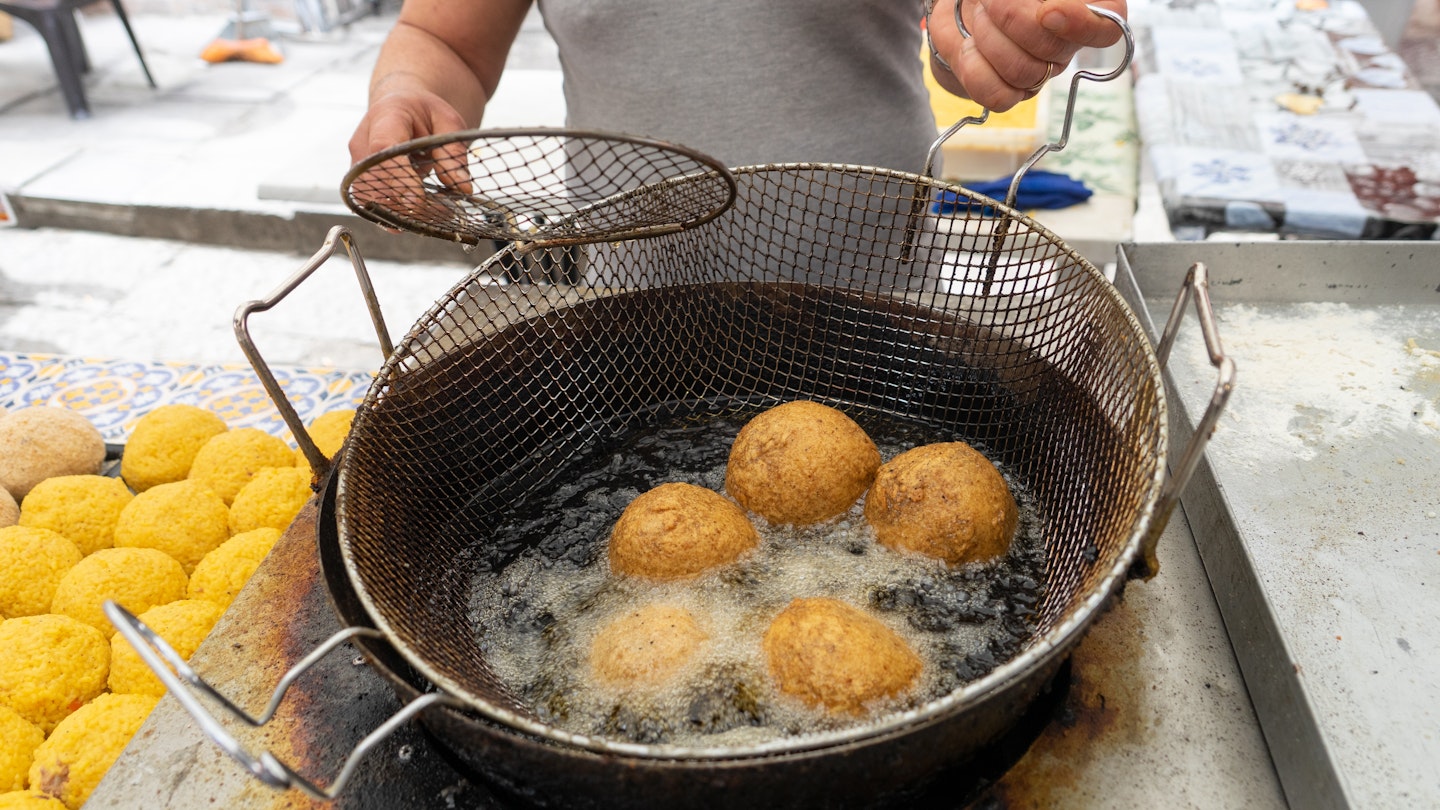It’s not all ancient temple ruins, baroque hill towns, and drop-dead-gorgeous beaches. Such is the epicurean clout, nous, and diversity of this Mediterranean heavyweight that it’s perfectly feasible to simply eat your way around Sicily and its ocean-fueled archipelagos.
Spaghetti ai ricci in sea-urchin sauce, swordfish carpaccio on a seafront terrace, veg-spiked arancini, and primeval offal at a market: whatever the time, place, or occasion, Sicily cooks up traditional dishes and street snacks bursting with seasonal flavor and top-quality island produce.
Fish and shellfish abound in this sun-spun kitchen. Over the centuries, successive waves of invaders, poverty, and deprivation have spiced things up with foreign flavors and smart tricks. In the face of a changing climate, innovative Sicilian farmers and winemakers experiment with new ways to grow old crops – and find new crops to replace old ones.
Pair all this with the island’s feisty lineup of cooks – Michelin-starred chefs, third-generation trattoria chefs, and wizened nonna (grandma) – and it’s a match made in earthy, honest foodie heaven.
Celebrate Sicilian Culinary Tradition in a Slow Food Trattoria
Each town, village, and even mountain has its own specialties and traditional dishes mirroring the land, season, and ancestral heritage. Celebrate the differences with pasta alla norma (pasta with eggplant, ricotta, basil, and tomatoes) in a traditional trattoria in Catania, pasta con le sarde (pasta with sardines, pine nuts, raisins, and wild fennel) in Palermo, and agghiotta di pesce spada (swordfish with pine nuts, sultanas, capers, olives, and tomatoes) in Messina.
Where to try it: Look for Slow Food-endorsed trattorias in Catania, Palermo, and Messina to savor these authentic dishes.
Sink Your Teeth Into a Virgin’s Breast
Honestly, Sicily’s enticing array of sweets and cakes crafted from homegrown almonds, pistachios, spices, and centuries of know-how is reason alone to never leave.
The top prize for instant seduction goes to minne di vergine (“virgin’s breast”) – an individual iced-white cake with a cherry on top. Other naughty-but-nice bites sold at pasticcerie (cake shops) include torte di ricotta (ricotta cake), exquisitely sculpted marzipan fruits, and cassata (an insanely sweet dessert cake made with ricotta, vanilla, pea-green icing, and candied fruit).
Crunch a Creamy Cannolo – Fingers Only!
A raft of unspoken rules envelop Sicily’s iconic cannolo (plural: cannoli) – a crispy, tubular pastry shell filled to order with velvety ricotta cream. Avoid pre-filled shells; left to sit, the shell becomes soggy, destroying the entire crunchy bliss of the cannoli experience. Ditch cutlery – eating is strictly fingers only. Alternate ends between bites.
Scoff Calf Spleen and Goat Intestines on a Palermo Street
Sicilian street food doesn’t get cheaper or more spectacular than Palermo’s signature pani ca’ meusa – a soft bread bun stuffed with boiled and lard-fried calf spleen, lung, and trachea. Another classic is stighiola (veal, lamb, or goat intestines wrapped around a spring onion or leek), a dish brought to Sicily by the Greeks thousands of years ago. The grilled offal is always served in chunks, salted, with a fresh wedge of lime.
Play Ball: Snack Attack on Arancini
If Sicilians aren’t nursing a gelato (in a cone or brioche bun) during Sunday’s sacrosanct passeggiata (afternoon stroll), they’re popping arancini. The deep-fried rice balls – roughly golf-ball-sized – are coated with breadcrumbs and filled with meat, sausage, cheese, herbs, veggies, and nuts of all sorts; pistachios, harvested in fall, are a diehard favorite.
Keep Cool – Suck Ice
Beat Palermo’s city heat with an old-school beaker of grattatella – ice shavings scratched by hand from a huge block of ice wrapped in cloth and served with fresh fruit syrup. Island-wide, granita (crushed ice made with fresh fruit) is refreshing any time of day. Go local: buy a brioche (sweet bread bun) to rip and dunk in the crushed ice. Mulberry, pomegranate, pistachio, and watermelon are popular summer flavors.
Embrace World Flavors with Couscous Alla Trapanese
In western Sicily, Trapani’s unique position on the sea route to Tunisia has made couscous a local specialty. This dish involves a steaming-hot bowl of aromatic seafood, garlic, chili, tomatoes, saffron, parsley, and wine broth, which you ladle over a heap of couscous. It’s perfect for sharing as a primi or ordering as a meal in itself.
Taste Marsala and Etna Vintages with Local Winemakers
As Italy’s second-largest wine-producing region, Sicily is certainly worth exploring for wine enthusiasts. Native Catarratto, Grillo, and Inzolia grapes fuel elegant whites, while Nero d’Avola, Nerello Mascalese, and Frappato yield robust reds. Don’t miss Sicily’s only DOCG wine, Cerasuolo di Vittoria, blending Nero d’Avola and Frappato.
Feast on Aeolian Island and Ocean Flavors
Mediterranean fish and shellfish – particularly swordfish, tuna, mackerel, and delicate clams – serve as lasting foundations of Sicilian cuisine. Dishes like frittura mista (a battered, deep-fried mix of shrimp, squid, and/or fish), carpaccio di spada (raw marinated swordfish), and tonno scottato al pistachio (seared tuna in pistachio crust) are practically staples.
Vegetarians and Vegans
Sicily’s natural abundance of quality fruits and vegetables makes catering to non-meat eaters a tradition. Plenty of classic Sicilian antipasti, pastas, and contorni (side dishes) feature a variety of vegetables.
Vegetarians can’t go wrong with caponata (Sicily’s emblematic dish of eggplant, tomatoes, olives, and capers) and busiate alla trapanese (hand-twirled pasta with tomato, basil, garlic, and almond pesto).
It’s more challenging for vegans, as many island dishes feature butter, eggs, or other animal products. When buying cannoli, checking the oil used for frying the shell is essential, as traditional recipes often utilize pork lard, though many modern pastry chefs use vegetable oil.





